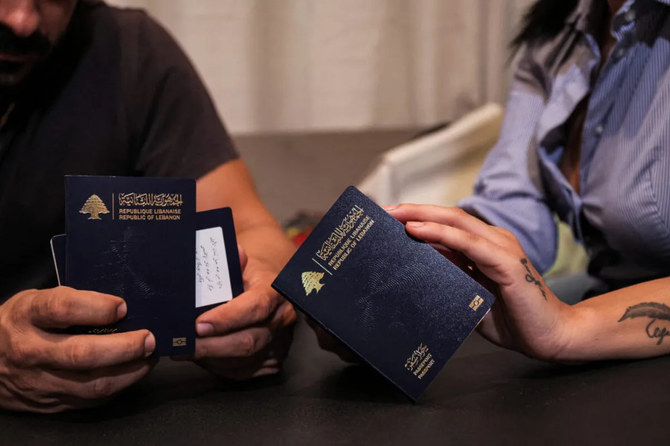BEIRUT: Lebanese authorities have stopped accepting applications for passport renewals, saying they are unable to keep up with demand, as the country’s worsening economic crisis pushes people to leave the country.
The Lebanese General Security has said that it will suspend passport renewals from this week and that its stock of passports will cover only current applicants.
The announcement has sparked fears that authorities are determined to stop people leaving Lebanon, limiting their freedom of movement.
Maj. Gen. Abbas Ibrahim, director-general of General Security, said: “The passport application platform has scheduled appointments until April 2023, and passports will be delivered to all those who have already applied until that date.”
Lebanese have been rushing to get biometric passports since 2020, with requests for renewals 10 times higher than in previous years.
Locals anticipated a rise in passport fees, so rushed to get new documents, while expats took advantage of their vacations in Lebanon to renew their passports for about $35, avoiding the $200 or $300 payment required at Lebanese embassies abroad.
A study by the General Directorate of General Security found that 69 percent of people obtained passports without using them, and that about 20,000 citizens renewed their passports in 2021, although they had two more years before their documents expired.
The study also found that more than 15,000 passports were processed, but were never claimed by their owners.
The General Security said: “As of 2020, our main and regional centers had 10 times more passport applications than previous years, which affected our passport inventory.”
Brig. Gen. Mounir Akiki, from General Security, told Arab News that the rising number of applications and dwindling stock forced authorities to act.
New conditions were issued in February for renewing passports that some believed were impossible to meet.
Requirements included having a valid residency abroad, a valid visa affixed to the passport to be renewed, an embassy appointment within a month of the date of submitting the application, or evidence of continuing studies abroad, or medical reports if the purpose of renewing the passport is to continue treatment abroad, or to show a signed work contract and necessary documents if the purpose is to work abroad.
In addition, the biometric passport fee was raised from 300,000 Lebanese pounds ($200) to 600,000 Lebanese pounds (valid for five years) and from 500,000 Lebanese pounds to 1.2 million Lebanese pounds (valid for 10 years).
Akiki said that issues with passport were also behind the General Security’s decision.
“In 2021, we realized the repercussions of the economic crisis in Lebanon and signed a contract with the French company that prints Lebanese passports worth $12 million in return for printing 1 million passports, but the company requested to transfer a certain amount as a documentary credit to start printing, and according to the Code of Money and Credit in Lebanon, contracts must be signed in Lebanese pounds and not in dollars.”
He added: “When we signed the contract with the French company, the dollar exchange rate was based on the official rate, i.e. 1,500 Lebanese pounds to the dollar, and there was no exchange platform affiliated with the Central Bank that sets rates in accordance with financial market movements.”
This affected the continuity of the work. Akiki claimed that Ibrahim urged several politicians to end the crisis, but without success.
According to Akiki, there will be no passports available after April 2023 if the issue is not resolved by then.
Discussing the possibility of renewing old passports as an alternative, Akiki said: “We cannot do that. The old passport has been canceled and can no longer be used. This decision is made by the International Civil Aviation Organization.”
Akiki said that the contract with the French company was worth around 22 billion Lebanese pounds, based on the official exchange rate.
But he said the value increases to around 300 billion Lebanese pounds as per the central bank’s Sayrafa platform rate (around 22,000 Lebanese pounds to the dollar).
The Lebanon Crisis Observatory at the American University of Beirut has predicted a wave of emigration from Lebanon in coming years.
A key indicator is that 77 percent of young people are considering emigrating, while specialists and professionals are also leaving in search of better working conditions and income.
Thousands of Lebanese, including teachers, doctors, nurses and university graduates, left the country two years ago, and the number of departures increased after the Beirut port explosion.
The World Bank estimates that Lebanon will need at least 12 years to return to 2017 gross domestic product levels.
This will pressure hundreds of thousands to leave the country in order to invest, work, study and retire abroad, the bank said.


























